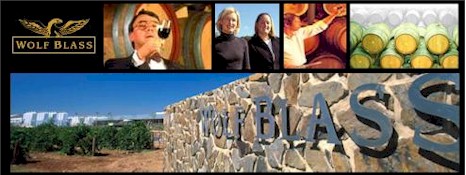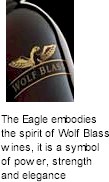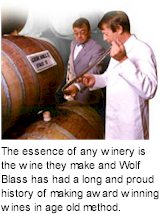


Wolf Blass Wines International was born in 1973 when Wolf started his own business, purchasing a 2.5 acre land holding with an old army shed outside Nuriootpa, at the northern end of the Barossa Valley. John Glaetzer joined the company and from 1974-1976 Wolf Blass Wines won three consecutive Jimmy Watson Trophies, the Black Label generated substantial publicity and hype. From this time onwards growth was impressive with Wolf Blass Yellow Label and Riesling becoming Australia's top selling red and white wine.

Wolf Blass AM was born in East Germany in September 1934. After studying and working in the European wine industry for 13 years he migrated to the Barossa Valley, South Australia in 1961 with 100 pounds in his pocket, and the belief that he could "probably add something" to the Australian wine industry. Wolf's first job after arriving in Australia was as Sparkling Wines Manager for Kaiser Stuhl in the Barossa Valley. He also worked as a freelance technical adviser for independent producers.
In 1966 Wolf registered the business name Bilyara, the aboriginal word meaning Eaglehawk. Wolf produced his first vintage of 250 dozen in the same year. Through 1969 to 1973 Wolf worked as Manager and Winemaker for Tolleys where he made his first significant impact on the local wine industry with development of red wine styles. He was considered one of the leaders of the new generation of Australian winemakers, creating individual wines of various styles under his own label.
Exports first started in the mid-1970s, and in 1984 Wolf Blass Wines became a publicly listed company. By the end of 1990, the number of National and International awards totalled an incredible 2,575 comprising 135 trophies, 712 gold medals, 812 silver medals, 869 bronze medals, and 47 diplomas. Wolf's amazing run of show awards outside the Jimmy Watson Trophy includes: Best red wine in Adelaide Show (Montgomery Trophy) in 1978-1983, 1986-1988, Best red wine in Sydney Show 1981-1983 and 1985, and Most successful red wine exhibitor in National Shows 1980-1988

Under the guidance of Chief Winemaker Chris Hatcher, the steady hand of veteran John Glaetzer and the contemporary influences of Wendy Stuckey, Caroline Dunn and Kirsten Glaetzer, the award total for Wolf Blass now stands at over 3,000 awards at international and Australian wine shows and includes an unprecedented fourth Jimmy Watson Trophy for the 1998 Black Label at the 1999 Royal Melbourne Wine Show. In 2001 The International Wine and Spirit Competition recognised the achievements of Wolf Blass, with an award for the Best Australian Wine Producer.
In 2001, Wolf was appointed as a Member in the Order of Australia for "service to the development of the Australian Wine Industry and to the promotion of excellence in winemaking, viticulture, marketing and research." In 2006, Wolf was awarded the Cross of the Order of Merit (Das Bundesverdienstkreuz) by the Federal Republic of Germany (one of the German government's most prestigious honours) for "nurturing positive relationships and partnerships between the German and Australian peoples, cultures and countries."
Wolf Blass AM is currently the Ambassador for Wolf Blass Wines International, participating in promotions, overseas development and maintaining the quality style of the winemaking production. As they have for almost 30 years, Wolf Blass wines continue to delight wine lovers all over the world.
